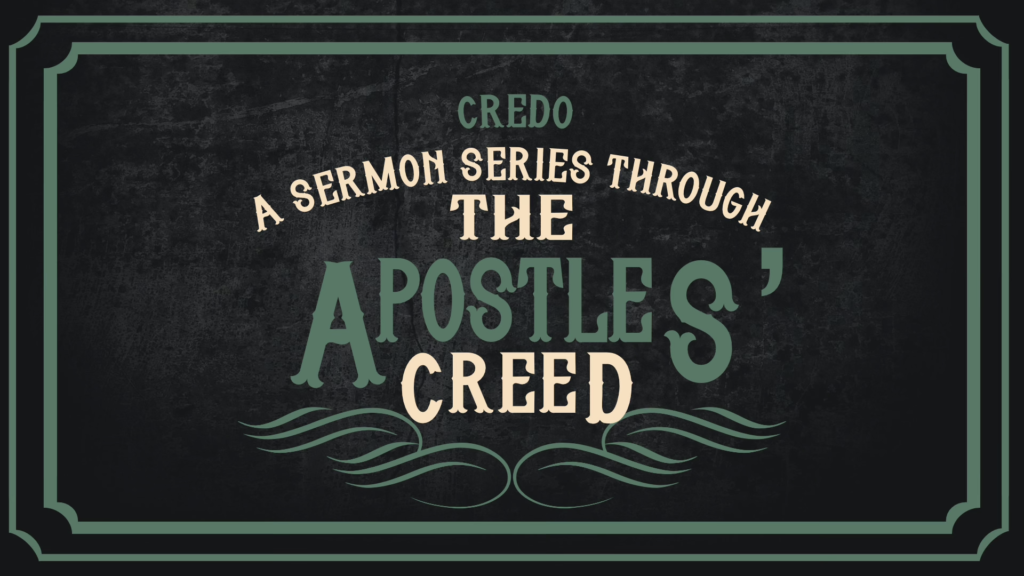
There is a phrase in the Bible and a phrase frequently said by Christians that many Muslims find absolutely shocking and offensive. That phrase is “Son of God.”
Collin Hansen, in his Christianity Today article, “The Son and the Crescent,” explains.
The Qur’an explicitly states that God could not have a son. In Arabic, the word ibn (“son of”) carries biological connotations. Muslims reject the possibility that God could have produced a son through sexual relations with Mary. Christians confess that Jesus was conceived by the Holy Spirit and born of the Virgin Mary. But this distinction is lost on many Muslims who lack the theological context for understanding nuanced Christian teaching on the Trinity.
The problem, however, far surpasses a theological argument between Muslims and Christians. In fact, the Qur’an (At-Tawba 9:30) says God curses anyone who would utter the ridiculous blasphemy that Jesus could be ibnullâh (“a son of God”). Not only do Muslims disagree with Christians about the identity and nature of Jesus, they also incur a curse for even mentioning the phrase “Son of God.”
Rick Brown, a Bible scholar and missiologist, has been involved in outreach in Africa and Asia since 1977 and regularly consults on language development and linguistics, including Bible translations. He says pious Muslims would sooner leave the presence of someone who utters the phrase than risk judgment in hell for hearing it. Even those who lack such devout scruples think hearing or reading “Son of God” will bring bad luck. Many avoid associating with Westerners altogether, regarding them as polytheists who harbor strange views about God’s family.[1]
Hansen goes on to explain that this reality has led to an intense debate between Bible translators, with some either dropping the language of “Son of God” in reference to Jesus or adding qualifying language to the phrase to distinguish it from biological sonship and others arguing that this goes too far, compromises the integrity of these translations, and ultimately hinders evangelism and missions by making too many concessions to Muslim readers.
That is an interesting debate, but for our purposes let us say this: the language of “Son of God” is critically important to our understanding of Jesus, has deep biblical attestation and roots, and must be rightly understood and articulated.
We have considered what it means to call Jesus “Christ.” Let us consider now what it means to call Jesus “Son of God.”
To call Jesus “Son of God” is to acknowledge that He is a distinct person from the Father.
We note, first, that calling Jesus “Son of God” necessarily distinguishes Him from the Father. He is a distinct “person” from the Father. Let me explain what we mean by “person.” Theologians normally use this language of “person” to distinguish the three persons of the Trinity. “Person,” here, is not synonymous with “biological person,” as the Father and Spirit are spirit and non-corporeal. It is a technical term. Theologian James Leo Garrett writes that “person” “[i]n reference to the Christian doctrine of the Trinity…means the essential differentiation within the Godhead.” It is a word, in this context, intended “to demarcate the Father, the Son, and the Holy Spirit.”[2]
That the Son is not the Father can be demonstrated in a number of ways from scripture. The first would be the obvious fact that the Father refers to Jesus as “Son” and Jesus refers to the Father as “Father.”
Another way to highlight the distinction between the persons is to point to the fact that Jesus prayed to the Father. In John 17, we see the Son praying to the Father in the “High Priestly Prayer.”
1 When Jesus had spoken these words, he lifted up his eyes to heaven, and said, “Father, the hour has come; glorify your Son that the Son may glorify you, 2 since you have given him authority over all flesh, to give eternal life to all whom you have given him. 3 And this is eternal life, that they know you, the only true God, and Jesus Christ whom you have sent.”
We see in this prayer that there is a mutual glorification between the Father and the Son, but also we find here the language of “giving”: the Father has “given” the Son “authority…to give eternal life.” What is more, Jesus says in verse 3 that the Father “sent” the Son.
So there is a distinction in the persons, a distinction between Father, Son, and, as we will, see, Holy Spirit.
We also see the Son subordinating Himself in the Garden of Gethsemane to the Father. In Matthew 26, we read:
39 And going a little farther he fell on his face and prayed, saying, “My Father, if it be possible, let this cup pass from me; nevertheless, not as I will, but as you will.”
The first reality we must recognize in the relationship between the Father and the Son is their distinction. Now, if this makes you uneasy, please hold on for just a moment. There is more to the story. But let me simply assert that the distinction in the persons of the Trinity is not only orthodox Christian theology, it is biblically grounded, first in the biblical evidences of the distinction we just saw (and many other evidences like them) but also in the evidences we now turn to for a similarity of substance.
To call Jesus “Son of God” is to acknowledge that the Son and Father are of the same essence or substance.
Yes, there is a distinction in the persons of the Godhead (the persons of the three-in-one God, the Trinity), but there is a sameness or unity of essence or substance. In other words, there is a unity that defies our understanding such that we can proclaim that the three—Father, Son, and Spirit—are one!
In John 17, Jesus continues His “High Priestly Prayer” with these words:
4 I glorified you on earth, having accomplished the work that you gave me to do. 5 And now, Father, glorify me in your own presence with the glory that I had with you before the world existed.
Here we see the distinction of persons and the unity of essence: the Father gives the Son “work…to do,” yet the Father and Son share glory from “before the world existed.” There is distinction, but there is also radical unity.
What this means is that the sharing of essence establishes Jesus’ full deity and the language of Son establishes His distinction from the Father. But being the Son of the eternal God also means that Jesus is God. The theologian Michael Bird writes:
Importantly, Jesus’s sonship does not have a historical beginning, because he is the eternal Son. Jesus does not become the Son at his birth, baptism, or at the resurrection. Whereas a Roman general could be appointed as a “son of god” through adoption by the “divine” emperor and be made his heir, Jesus was the Son of God by virtue of his divine nature. Jesus’ identity and relationship with the Father precedes his earthly life. The Father always had a Son and the Son always had a Father. The eternal nature of that relationship was largely inferred from the economy of redemption. As Wolfhart Pannenberg put it, “If God has revealed himself in Jesus, then Jesus’ communion with God, his Sonship, belongs to eternity.”…Epiphanius commented on Matthew 16:16, saying, “If Christ is the Son of God, by all means he is God. If he is not God, he is not the Son of God. But since he himself is the Son, and as the Son takes up all things from the Father, let us hold this one inseparably in our heart because there is no one who escapes his hand.”
John, in John 1, gets at the same reality. Watch:
1 In the beginning was the Word, and the Word was with God, and the Word was God.
14 And the Word became flesh and dwelt among us, and we have seen his glory, glory as of the only Son from the Father, full of grace and truth.
The Word, Jesus, “is God,” and the Word who is God “became flesh.” As such, He, the Word who is God, Jesus, is understood to be “the only Son from the Father.” Distinction, but unity. Father, Son, Holy Spirit: three…in one!
We might see this most powerfully in John 14, in Jesus’ exchange with Philip.
8 Philip said to him, “Lord, show us the Father, and it is enough for us.” 9 Jesus said to him, “Have I been with you so long, and you still do not know me, Philip? Whoever has seen me has seen the Father. How can you say, ‘Show us the Father’? 10 Do you not believe that I am in the Father and the Father is in me? The words that I say to you I do not speak on my own authority, but the Father who dwells in me does his works. 11 Believe me that I am in the Father and the Father is in me, or else believe on account of the works themselves.
There is a oneness in essence. As the Nicene Creed puts it:
And in one Lord Jesus Christ,
the only Son of God,
begotten from the Father before all ages,
God from God,
Light from Light,
true God from true God,
begotten, not made;
of the same essence as the Father.[3]
We have one God in three distinct persons. The oneness does not obliterate the threeness but neither does the threeness obliterate the oneness. In the Lorica prayer of St. Patrick, we find this beginning:
I arise today
Through a mighty strength, the invocation of the Trinity,
Through a belief in the Threeness,
Through confession of the Oneness
Of the Creator of creation.[4]
Throughout Christian history, many Christians have struggled to understand and hold to both of these important ideas. For instance, consider the example of “the triface Trinity,” an artistic depiction of the Trinity from medieval times.

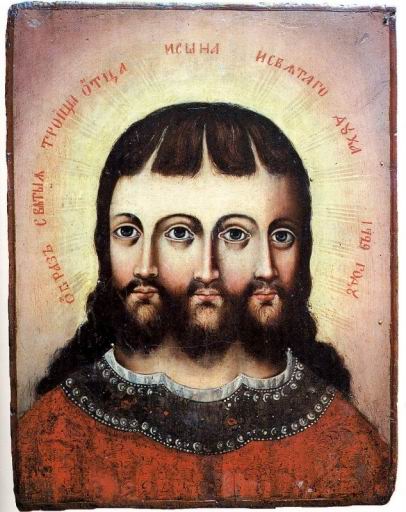
It has been widely banned by church authorities throughout the world and remains as a curiosity piece in the history of Christian art. The depiction gets the unity of God right—the oneness or essence—but does not do so well with the distinction of persons in that all three of the faces on the one head are identical. Furthermore, this awkward depiction would be a good cautionary tale against trying to create artistic depictions of the Trinity at all!
A better approach would be what’s called the “Scutum Fidei,” the “Shield of Faith,” which is essentially a diagram used by earlier Christians to communicate two truths:
- The Father is not the Son. The Son is not the Spirit. The Spirit is not the Father.
- The Father is God. The Son is God, The Spirit is God.
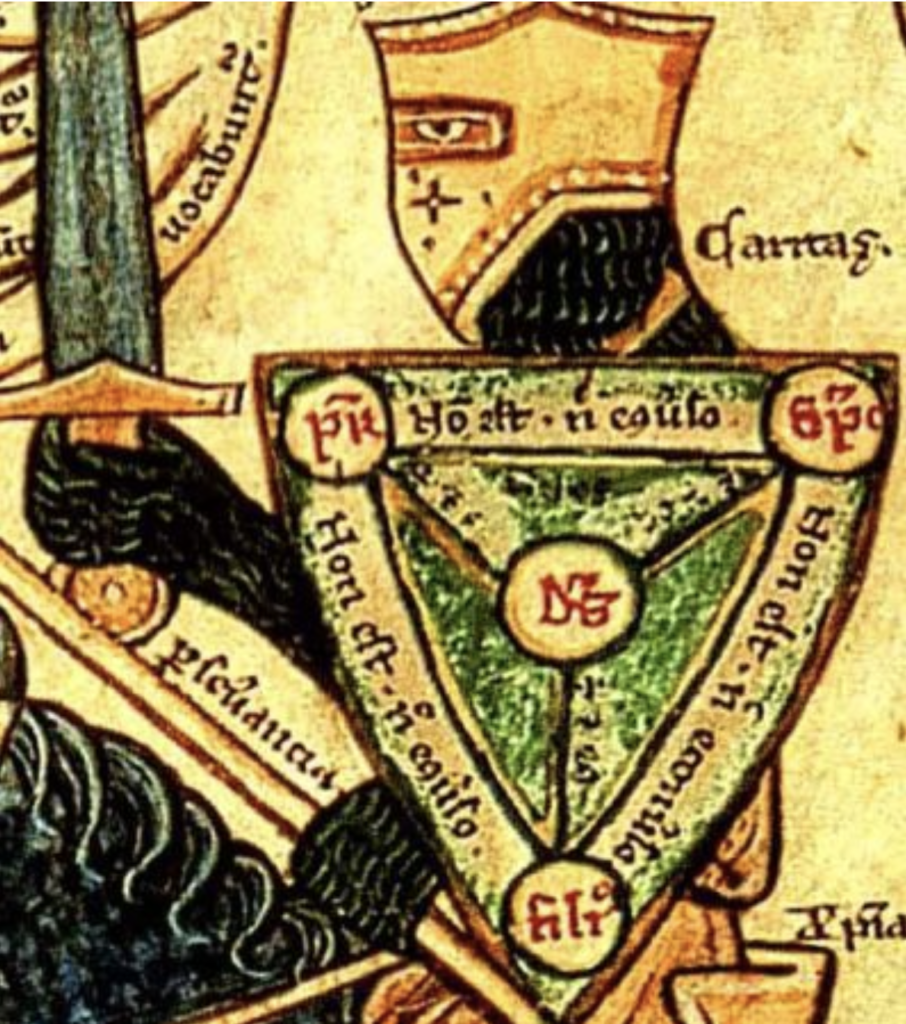
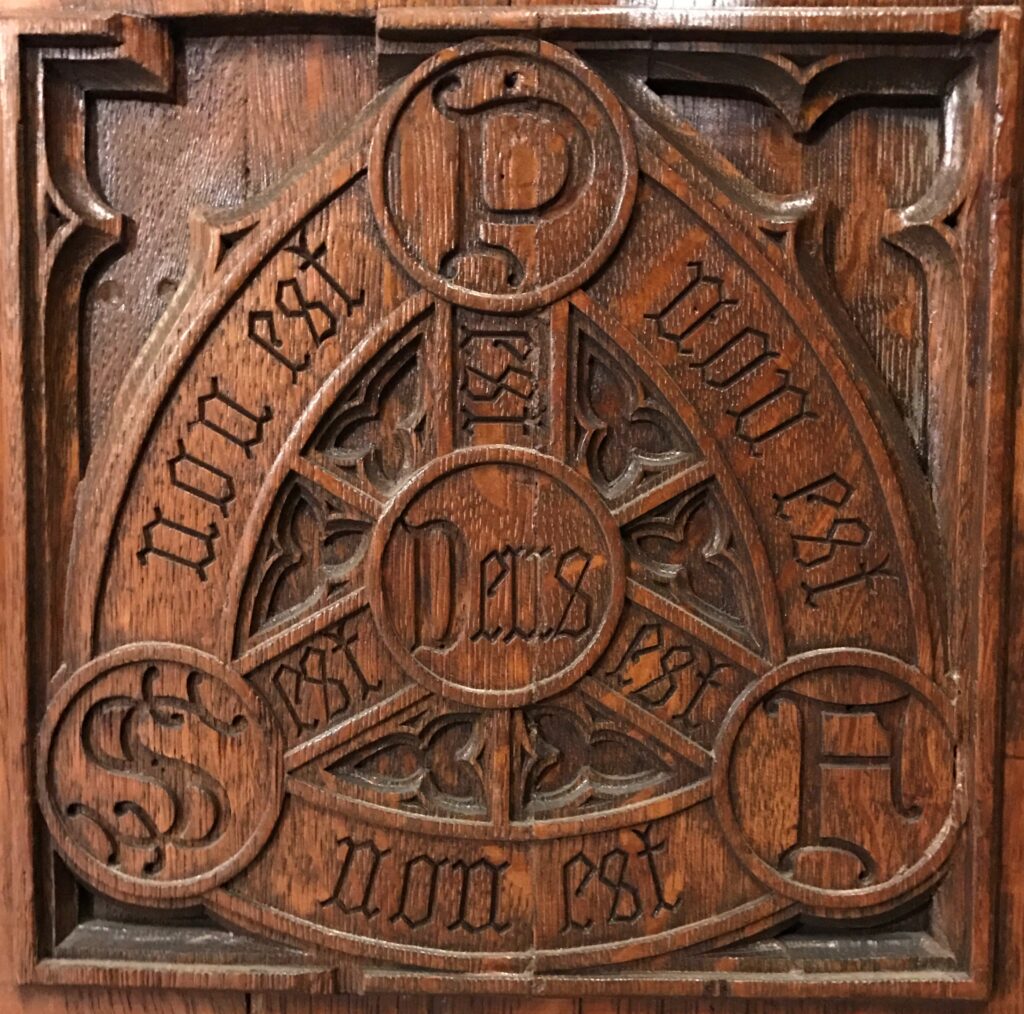
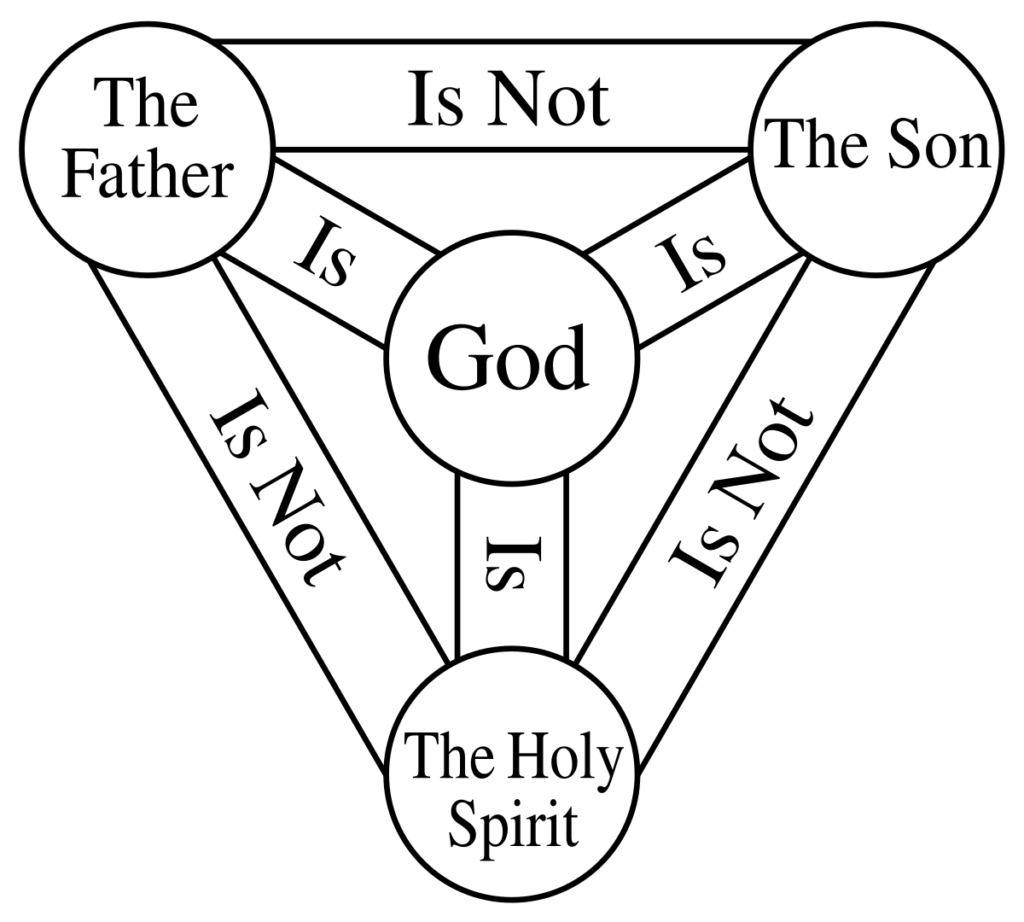
Three distinct persons. One essence or substance.
To call Jesus “Son of God” is to acknowledge the love and unity within God: Father, Son, and Spirit.
In the midst of all of this heavy theology, however, let us not miss the most obvious fact: to call Jesus “Son of God” is to say that He exists in loving and unified relationship with His Father and the Holy Spirit. “Son” is a relational word, a family word, and it evokes images of love. William Barclay writes:
In sonship there is at one and the same time identity and difference. No one can be closer to a father than a son; they can be of one mind and one heart; and yet they remain separate persons. The word son sums up in itself a double relationship, a two-sided relationship, which can be expressed through no other word.[5]
And, sure enough, when the Father speaks of the Son or the Son of the Father in the scriptures, we find words of love and unity. Consider the baptism of Jesus in Matthew 3.
16 And when Jesus was baptized, immediately he went up from the water, and behold, the heavens were opened to him, and he saw the Spirit of God descending like a dove and coming to rest on him; 17 and behold, a voice from heaven said, “This is my beloved Son, with whom I am well pleased.”
Note we have here all three persons of the Trinity: Father, Son, and Spirit. But note, too, the relational expression of love and unity: “This is my beloved Son, with whom I am well pleased.”
God the Father loves God the Son. He is a good Father. He is a good Son. Their bond is indescribable. In John 10, Jesus says:
30 I and the Father are one.
And if this is so—if the Father and Son and Spirit are one, united in love and purpose—then that means that the Son’s invitation to come into saving relationship with the Father through Him is itself an expression of love. Which is why we find, in John 3, these amazing words:
16 For God so loved the world, that he gave his only Son, that whoever believes in him should not perish but have eternal life. 17 For God did not send his Son into the world to condemn the world, but in order that the world might be saved through him. 18 Whoever believes in him is not condemned, but whoever does not believe is condemned already, because he has not believed in the name of the only Son of God.
The loving Father sends the loved Son to a world that is loved by the Triune God in order to make a way for the world to come back to God.
It is the greatest love story in the entire world! The gospel! And it is a story that we are a part of by virtue of being the objects of our Triune God’s affections. That the Father would give the Son who He loves so much as a payment for our sins is an astonishing fact. It shows how united the Father, Son, and Spirit are in their redemptive purposes. It also shows how deep the love of God is.
I believe in Jesus Christ, His only Son.
[1] https://www.christianitytoday.com/ct/2011/february/soncrescent.html
[2] Garrett, James Leo, Jr. Systematic Theology. Volume 1 (Eugene, OR: Wipf & Stock, 1990).
[3] https://www.ccel.org/creeds/nicene.creed.html
[4] https://www.ewtn.com/catholicism/devotions/lorica-of-saint-patrick-349
[5] Barclay, William. The Apostles’ Creed for Everyman. (New York, NY: Harper & Row, Publishers, 1967), p.61.

What a great series of messages on basics/essentials from a human crafted Credo! It was way, way more better in print than trying to grasp it by online means esp. those of us who are yet SLOW learners; third time through made it all become very clear so thank you for putting the text online; it works albeit ever so slowly. The Tortoise won the race; poor Hare….. always on the run and always way too sure he could win any time he wanted. What the world needs now is more new Wymanators leaving CentralU to share/spread/take the gospel a wee bit further. God bless CBCNLR & Dr. Richardson; so much left undone and too few “it seems” sometimes in the field; Lord send Little Rock more workers to help. Matt 9:37,38 🙂
Thank you John. Bless you brother.